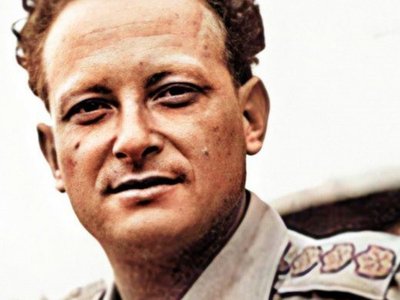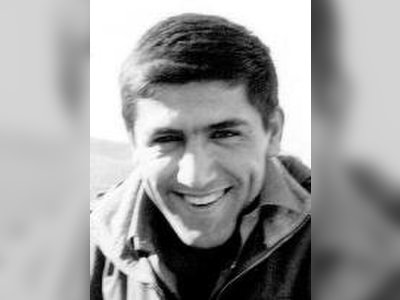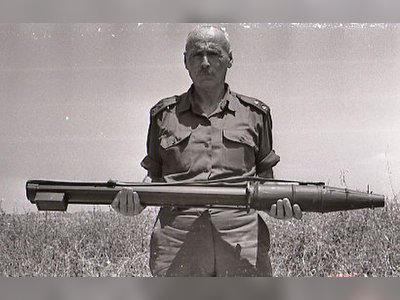מורשת גדולי האומה
בזכותם קיים
beta
Yitzhak Rabin: The Man Who Pursued Peace
Yitzhak Rabin's life epitomizes the complex narrative of Israel—a nation born in conflict, striving for security, and seeking peace. His contributions to Israeli security and his courageous pursuit of peace are a testament to his enduring impact on the nation's history. Yitzhak Rabin remains an iconic figure, forever remembered for his unwavering commitment to securing Israel's future and his bold steps towards peace in the Middle East.
Yitzhak Rabin was a prominent Israeli statesman, military leader, and Nobel laureate who played a pivotal role in shaping Israel's history. Born on March 1, 1922, in Jerusalem, he dedicated his life to securing Israel's existence and striving for peace in a region plagued by conflict. This documentary delves into the life, achievements, and tragic assassination of Yitzhak Rabin.
Early Life and Military Career:
Yitzhak Rabin's life was deeply intertwined with the tumultuous history of Israel. He grew up in Tel Aviv and joined the Haganah, a Jewish paramilitary organization, during his youth. Rabin's military career was marked by distinction. He served as the chief of staff of the Israel Defense Forces (IDF) during the Six-Day War in 1967, which led to Israel's stunning victory against its Arab neighbors.
Contributions to Israeli Security:
Rabin's dedication to Israel's security continued throughout his career. As defense minister in the 1970s, he played a crucial role in orchestrating the daring Entebbe hostage rescue mission in Uganda. His leadership during the Yom Kippur War in 1973 further solidified his reputation as a brilliant strategist.
The Quest for Peace:
While Rabin's early years were marked by military service, his later years saw a shift towards diplomacy. In 1992, he was elected as Israel's prime minister for the second time, and his government began pursuing peace with the Palestinians. This marked the start of the Oslo Accords, a historic peace process that aimed to establish a framework for Palestinian self-governance and, eventually, a lasting peace.
The Oslo Accords:
The Oslo Accords, signed in 1993 on the White House lawn, were groundbreaking. Rabin, along with Palestine Liberation Organization (PLO) leader Yasser Arafat and U.S. President Bill Clinton, shook hands and embarked on a path towards peace. Rabin's willingness to negotiate with the PLO was initially met with skepticism, but his leadership and commitment to ending the Israeli-Palestinian conflict resonated with many.
The Nobel Peace Prize:
In 1994, Yitzhak Rabin, Yasser Arafat, and Shimon Peres were jointly awarded the Nobel Peace Prize for their efforts in advancing the peace process. Rabin's transformation from a warrior to a peacemaker was symbolic of Israel's hopes for a peaceful future.
Tragic Assassination:
On November 4, 1995, Yitzhak Rabin's life was cut short when he was assassinated by Yigal Amir, an Israeli extremist opposed to the Oslo Accords. Rabin's death shocked the world and deeply affected Israel. Thousands of mourners gathered to pay their respects to the fallen leader, and his legacy as a symbol of peace endured.
Early Life and Military Career:
Yitzhak Rabin's life was deeply intertwined with the tumultuous history of Israel. He grew up in Tel Aviv and joined the Haganah, a Jewish paramilitary organization, during his youth. Rabin's military career was marked by distinction. He served as the chief of staff of the Israel Defense Forces (IDF) during the Six-Day War in 1967, which led to Israel's stunning victory against its Arab neighbors.
Contributions to Israeli Security:
Rabin's dedication to Israel's security continued throughout his career. As defense minister in the 1970s, he played a crucial role in orchestrating the daring Entebbe hostage rescue mission in Uganda. His leadership during the Yom Kippur War in 1973 further solidified his reputation as a brilliant strategist.
The Quest for Peace:
While Rabin's early years were marked by military service, his later years saw a shift towards diplomacy. In 1992, he was elected as Israel's prime minister for the second time, and his government began pursuing peace with the Palestinians. This marked the start of the Oslo Accords, a historic peace process that aimed to establish a framework for Palestinian self-governance and, eventually, a lasting peace.
The Oslo Accords:
The Oslo Accords, signed in 1993 on the White House lawn, were groundbreaking. Rabin, along with Palestine Liberation Organization (PLO) leader Yasser Arafat and U.S. President Bill Clinton, shook hands and embarked on a path towards peace. Rabin's willingness to negotiate with the PLO was initially met with skepticism, but his leadership and commitment to ending the Israeli-Palestinian conflict resonated with many.
The Nobel Peace Prize:
In 1994, Yitzhak Rabin, Yasser Arafat, and Shimon Peres were jointly awarded the Nobel Peace Prize for their efforts in advancing the peace process. Rabin's transformation from a warrior to a peacemaker was symbolic of Israel's hopes for a peaceful future.
Tragic Assassination:
On November 4, 1995, Yitzhak Rabin's life was cut short when he was assassinated by Yigal Amir, an Israeli extremist opposed to the Oslo Accords. Rabin's death shocked the world and deeply affected Israel. Thousands of mourners gathered to pay their respects to the fallen leader, and his legacy as a symbol of peace endured.


